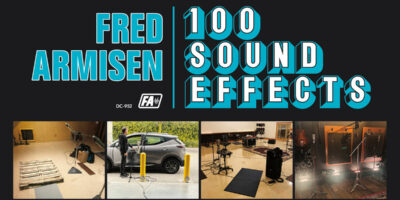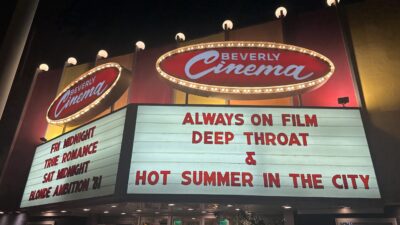This article previously appeared on Crossfader
Genre: Indie Folk, Singer/Songwriter
Favorite Tracks: “Thomas County Law,” “Summer Clouds,” “Call It Dreaming,” “Our Light Miles”
It’s probable that a majority of the country has been exposed to an Iron & Wine song without even knowing it. A moniker for singer-songwriter/multi-instrumentalist Samuel Beam, Iron & Wine’s melodies have been used in Twilight, a Nicholas Sparks movie, an M&M commercial, and more. But to say that this is at all indicative of the caliber of artistry Beam is capable of expressing would be simply untrue. He never set out for commercial success, and even after gaining some, he’s managed to keep the reigns on his career and move it into the direction he so chooses.
Starting as a lo-fi project recorded in his bedroom, Iron & Wine first cropped up in 2002 with THE CREEK DRANK THE CRADLE. Over the next few years, he joined the likes of Bon Iver and Sufjan Stevens, leading the indie folk scene of the mid-2000s. His later albums saw him pushing towards a fuller sound, and away from folk almost entirely. After an experimental bout on 2011’s KISS EACH OTHER CLEAN, Beam took a break from solo work to collaborate with musicians such as Ben Bridwell and Jessica Hoop. Iron & Wine’s first solo material in years is delivered to us in the form of BEAST EPIC, the title of which refers to a story whose animalian protagonist acts with human-like traits. With BEAST EPIC’s tasteful accompaniments and lyrical wisdom, Beam is able to elevate a collection of already-strong folk songs to new heights.
For devotees, the album will feel like a homecoming, which undoubtedly brings a rush of nostalgia akin to visiting your childhood bedroom. It has the honeyed, warm simplicity of THE CREEK DRANK THE CRADLE and the hushed intimacy of OUR ENDLESS NUMBERED DAYS. Certain tracks swell with the same full-band sound that was introduced on THE SHEPHERD’S DOG. But still, these songs seem different somehow—more informed, more reflective. And most of all, more like they’re coming from the mouth of a distinct artist rather than existing on their own. Take “Each Coming Night” off of OUR ENDLESS NUMBERED DAYS for instance—it’s a pleasant folk song, but it is missing Beam’s unique thumbprint now present in his work. His sixth time around, Beam is in complete control and the homespun sound has never felt more completely his . From his breathy count-in that opens the record, “Claim Your Ghost” re-establishes what we’ve come to expect, but with more affirmation. His trademark melancholy is illuminated on “Summer Clouds,” whose message sinks like a stone in your heart. “By the end, we leave somewhere too long to ever wander back / By the end, we give someone too much to ever close their hand.”
As of late, Iron & Wine’s trajectory has seen Beam pushing towards more unconventional soundscapes, a deliverance from his standard batch of songs. A touch of his more idiosyncratic songwriting returns on “Last Night,” with rickety strings and xylophone, feeling a bit out of place amidst the rest of BEAST EPIC. It’s still a fair attempt to stir the pot, as a full album of swaying folk ballads can become stagnant. On the other side of the coin, the most straightforward song on the album, “Call it Dreaming,” is somehow able to avoid the trappings of blending in too much. Although treading well-known territory, the song feels miraculously fresh.
For BEAST EPIC, Beam focuses on live performance acoustics with minimal audio dubbing, creating a sound that feels both warm and hollow. It’s not empty, but rather it feels as if Beam is performing these songs to a candle-lit audience. It no longer sounds like he’s humming these songs to simply a lover or to himself—he’s pushing them out into the world. The memorable album closer “Our Light Miles” echoes in a way that gives it space to expand. It has a gorgeous swell, only for its second half to trickle back to a hush.
Another returning feature is the use of Biblical references in the Iron & Wine repertoire. Beam, who has described himself as “probably agnostic,” has utilized Christian imagery throughout his entire discography. It feels like less of an act of faith and more of a way to shed light on his patchy upbringing in the Bible belt; a way to convey feeling through familiar symbols. In “The Truest Stars We Know” he croons about “Jesus and his trophy wives,” “praying for the suicides and the orphans.” With a jaded tinge, he continues, “save us all from what we want, beautiful and beaten back to life.”
It’s not very often that we see an artist come full circle—presenting a sound and developing it, abandoning it altogether, and finally returning to it with new light. The result is a mature album that feels universal without being general. BEAST EPIC expresses sagacity without feeling hackneyed. And with current affairs, where it feels like the world is being held together by a thin ball of twine, music like this is more important than ever before.
Verdict: Recommend
















Comments